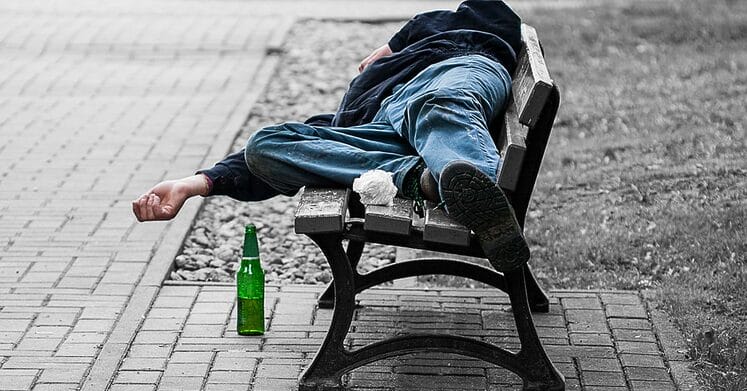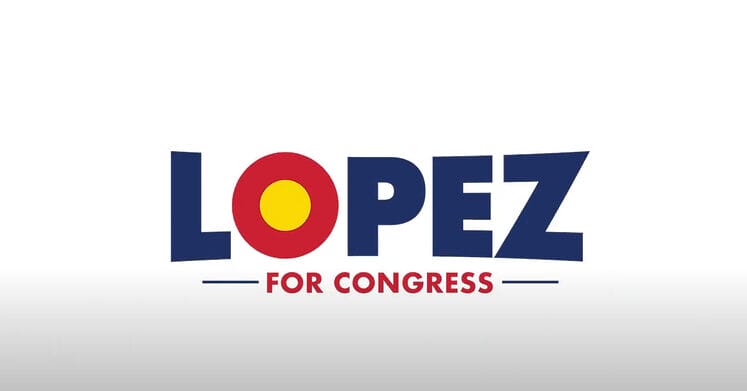
Along with out-of-control crime, homelessness – particularly in cities and states with the misfortune to be under Democrat tyranny – is a serious problem in America and continues to get worse all the time, no matter how much of YOUR tax money governments throw at the problem. Hint: there is not enough money in the world to solve the problem, and Democrats aren’t interested in fixing it.
We’ve all seen it: the tents, the trash, the cast-off furniture, the malnourished dogs, the illegal (and dangerous) campfires, the shopping carts, the passed-out people, the human and animal waste. The smell. The vague feelings of shame and sorrow for these fellow human beings who are living in such depressing and degrading circumstances.
We wonder what causes homelessness and how we can help these people to better their situations. We look to government to solve the problem, even though it is not government’s role to provide housing to everyone. We think that forced “compassion” in the form of ever-increasing government handouts will solve the problem, only to find that it actually makes it worse.
The homelessness crisis is fueled by the convergence of a few factors, all consequences (I can’t say “unintended consequences” because I believe they are, in fact, “intended”) of Democrat policies and cultural values that have changed over time.
For a deeper look into the problems of homelessness, I highly recommend Michael Shellenberger’s excellent book San Fransicko: Why Progressives Ruin Cities. I wrote a review of this book last year, it’s an excellent read.
Drugs and Alcohol
While estimates vary (homeless-friendly websites cite lower percentages and others higher percentages), it’s clear that a significant number of people who are homeless struggle with drug and alcohol abuse.
Think about it: in order to successfully support one’s life, one needs to hold down a job (or operate a business) that provides sufficient income to pay for food, housing and the other necessities of life. A person who is in the grip of addiction cannot do this because the addiction is all-consuming. It makes it difficult to show up to work on time and to perform well. In some jobs, there are safety concerns. The addict doesn’t care about work, they only care about the next high. When earned income and savings run out, they resort to crime to fuel their habits, which is one of the factors behind the increase in crime we’ve seen in recent years.
When a person is unable to work to support their life, what is there to do? Many look to the government for support. Many resort to borrowing, stealing or begging for money. They are unable to afford rent or mortgage payments and end up on the streets. From there, it is very difficult to escape the cycle without help, and more importantly, without a desire to get their lives together.
Such people, sadly, have always been with us. They used to be called “vagrants”, “hobos” or “drunks”. They lived on the fringes of society (certainly not in homeless camps next to the state capitol or the governor’s mansion) and were largely out of view, partly due to their own sense of shame, perhaps, and also because there were laws against vagrancy and illegal camping.
That has all changed, as Democrats have decriminalized everything, it seems, except maybe owning a 30-round magazine.
According to Michael Shellenberger in his book San Fransicko: Why Progressives Ruin Cities “In 2014 California voters passed Proposition 47 to make three grams of had drugs for personal use a misdemeanor instead of a felony. Proposition 47 also ended jail sentences for people convicted of many nuisance crimes, including possession of three grams of hard drugs and shoplifting under $950 worth of property.”1
Many authorities cite this one factor as why crime and homelessness in California has exploded to the crisis it is today. Colorado Democrats similarly decriminalized possession of dangerous drugs, with the same results in Colorado.
Mental Illness
Many of the homeless are mentally ill (in addition to possibly being addicted to drugs and/or alcohol) and are definitely incapable of being functional members of society. Most mentally ill individuals are harmless to others, but there is that small number of violently mentally ill homeless people that can cause problems for themselves and others.
As a long-time user of public transportation in the Denver area, I saw many instances of mentally ill people on light rail trains and downtown environs. While I was never threatened personally, I have witnessed some disturbing incidents and behaviors.
Mentally ill people, especially if they abuse drugs and/or alcohol, have many factors stacked against them. They are clearly unable to hold jobs, family and friend relationships can be strained, and it can be difficult for these people to access they help they need.
It used to be that more mentally ill people were housed in mental hospitals. However, starting in the mid 20th century California started closing mental hospitals to save money. Indeed, one can have an interesting debate as to whether or not it is a proper role of government to even operate mental hospitals. In fact, it was civil libertarians who promoted the California law that started the process of closing the institutions.2
As Shellenberger points out: “It was a Democrat who got the deinstitutionalization of psychiatric hospitals rolling. President John F. Kennedy proposed and successfully advocated a crucial 1963 reform that required the federal government to fund community mental health centers but leave it to the states to fund mental hospitals”3
California Democrats led the efforts to close mental hospitals and the nation soon followed. As a result, people who had been institutionalized ended up on the street, unable to support themselves and unable to get the help they need. Others, who may need mental health assistance, are unable to get it.
According the National Institute of Mental Health (NIMH), about 14 million adults or 5.5% of the population of America suffers from serious mental illness (“…defined as a mental, behavioral, or emotional disorder resulting in serious functional impairment, which substantially interferes with or limits one or more major life activities.”4), accounting for 20-25% of the homeless population.
Gobs of Cash
Question: “What happens when you incentivize something?”
Answer: “You get a lot more of it!”
People respond to incentives. This is true in every area of life and for any situation. It’s especially true when it comes to money.
Democrat-run cities and states think that it is “compassionate” to hand out cash to homeless people. For example, San Francisco, perhaps the poster city for homelessness, hands out $588 per month (probably more by now) in cash assistance for homeless individuals. I believe Denver talked about giving out $1,200 per month to LGTB homeless people.
Other cities that have significant homeless problems also hand out pretty generous “benefits” to homeless people.
San Francisco spends 6% of its budget on homelessness, and they wonder why so many homeless come there from elsewhere.
Poor Life Choices
Some people become homeless simply through making bad life choices. People who prefer to make a living by crime, for example, may be more prone to homelessness once they are discharged from jail or prison and find it difficult to find a job that pays well enough to support a home.
While homeless advocates talk about shelter and housing, the plain fact is that, inexplicably, some homeless people simply prefer to live on the streets instead of in shelters or other provided housing. One reason for this is that they don’t want to have restrictions placed on them, like segregation of men and women, or being able to use drugs or alcohol, and other factors.
The Cost of Housing
In order to not be homeless, one needs to live in a home. This can be a single-family home, a multifamily swelling or an apartment in a building. In order to secure such housing, one must pay rent, or purchase the property with the help of a bank (a mortgage), or for the lucky few, buy a house for cash.
Houses can be expensive, especially for those just starting out and who may not have a lot of savings accumulated for a down payment. Apartment rents can be quite expensive too, especially for “luxury” properties.
One thing that can cause the price of housing to go up is lack of supply (in accordance with the laws of supply and demand, something Democrats don’t seem to grasp). When Democrat policies cause the cost of housing to increase, it becomes less easy for those lower on the economic ladder to purchase their homes.
When Democrat policies restrict the supply of apartment homes, rents go up, which makes it harder for those lower on the ladder to rent a place to live.
And how do Democrat policies increase the cost of housing? Regulations, that increase the cost of materials and labor. Zoning laws, which reduce the available supply of land. Other government interference in free markets – usually engineered by Democrats – also contribute to the problem.
Once one is in a home or apartment, they must pay homeowner’s insurance and property taxes. We all know that Democrats will let property taxes go through the roof. Insurance becomes more expensive when laws and regulations force insurers to raise premiums or when crime increases loss rates. Some insurers will exit the markets in some states completely, resulting in fewer choices and less competition.
One has to pay utilities as well. Thanks to Democrats and their silly “green” agenda, utilities become more expensive due to perverse incentives, regulations, limits, mandates and the like. Every single person who survives a Colorado winter thanks to natural gas heat in their homes should be upset over how Democrats are openly trying to kill the oil and gas industry in Colorado and the nation.
Illegal Immigration
Another Democrat policy that contributes to the problem is the lack of border enforcement, particularly along the southern border.
According to the New York Post, nearly 4 million illegal immigrants have entered the United States since Joe “The Big Guy” Biden (D) took office. Does anyone think that these people have the resources to become housed, productive, taxpaying members of society? Of course not. They are sheltered in government facilities or are living on the streets.
The lack of enforcement of American law – promulgated by both parties over decades – is unconscionable. It is a national security risk (how many would-be terrorists have entered America illegally?), another reason why crime is spiking because of crimes committed by criminals who enter the country illegally then can’t be deported when arrested because of Democrat policies.
While virtue signaling about being “compassionate” they are creating a human tragedy of epic proportions.
Conclusion
Homelessness is a tough issue for society. Between all the conflicting arguments over who’s to blame and how to fix it, we tend to forget that these are real human beings who are suffering and we as a society should be working to figure out how to help them help themselves or at least have the discussion that some people may need to be institutionalized.
While the solutions to homelessness are elusive and difficult to grasp, we have real world results of the approaches of the progressive Left to homelessness. Those results are in, and it’s clear that their ideas and policies not only do not work, they actually make the problems worse.
By decriminalizing drugs and their misguided “harm reduction” ideas, they remove the adverse penalties from possession and use of dangerous drugs. At least, the penalties under law. Sadly, the most adverse penalty – death – is increasing all the time as more people die from drug overdoses.
By decriminalizing property theft, they incentive it, with the result that prices go up because stores have to charge more to cover their losses or go out of business altogether and leave an economic void, usually in minority communities.
With their view that the homeless have the “right” to camp anywhere they want, they contribute to the destruction of public spaces and impair private property. Some homeless advocates give out tents and camping equipment. Again, when you subsidize something, you get more of it.
Living in the real world, I can see that in the Republican-governed state of Oklahoma and the city of Oklahoma City, homelessness, while it exists, is not nearly the problem it is in blue cities and states. While we have services available here, I am not aware of any cash subsidies. There are relatively few homeless camps here, and they are nowhere as large or as semi-permanent as I’ve seen in other cities.
In the end, homelessness is just another pathology that is directly resultant from so-called “progressive“ policies and ideas. The only way to improve the situation is to vote all the progressives out of office next year. That means: vote Republican like your life depends on it.
Sources:
1 Shellenberger, Michael (2021) San Fransicko: Why Progressives Ruin Cities. HarperCollins, pages 47-48
2 Ibid, pages 85-86
3 Ibid pages 86-87









Responses